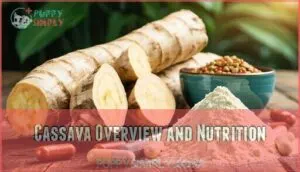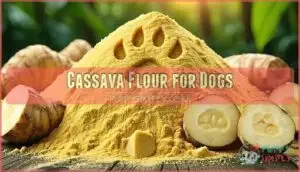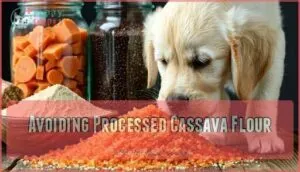This site is supported by our readers. We may earn a commission, at no cost to you, if you purchase through links.

This gluten-free flour can be safe for your pup when properly prepared, but raw cassava contains cyanogenic compounds that turn into cyanide when digested.
Commercial cassava flour is typically processed to remove these toxins, making it safer than raw cassava root.
However, it’s still not nutritionally essential for dogs and should only be given occasionally in small amounts.
Always choose high-quality, properly processed cassava flour and introduce it gradually to watch for digestive upset.
While it won’t replace your dog’s regular diet, understanding the proper preparation methods and safety precautions can help you make informed decisions about this trendy ingredient.
Table Of Contents
Key Takeaways
- You can feed your dog cassava flour, but only when it’s properly processed – commercial cassava flour is safer than raw cassava root since processing removes dangerous cyanogenic compounds that convert to cyanide.
- Always use moderation and choose high-quality products – cassava flour should be an occasional treat, not a dietary staple, and you’ll want to buy from reputable manufacturers who follow strict safety protocols.
- Watch for signs of cyanide poisoning – symptoms include bright cherry-red gums, rapid breathing, excessive drooling, vomiting, and muscle spasms, which require immediate veterinary attention.
- Consult your veterinarian before introducing cassava flour – your vet can assess your dog’s individual needs and help you determine if this gluten-free alternative is appropriate for your pet’s specific health conditions.
What is Cassava
You might know cassava by its other name, yucca, but this starchy root vegetable from South America has become a popular ingredient in many dog foods.
Cassava provides carbohydrates and essential nutrients, though it requires proper preparation to guarantee it’s safe for your furry friend.
Cassava Overview and Nutrition
Cassava, a tropical staple native to South America, serves as the world’s third-largest carbohydrate source in warm regions.
This woody shrub’s starchy root provides essential nutrition, including 40 grams of carbohydrates per 100 grams alongside vitamin C and mineral sources like copper and potassium.
When processed into cassava flour, this root composition offers dog nutrition benefits as a gluten-free alternative, though proper preparation remains vital for safety.
Cassava Flour for Dogs
How do you know if cassava flour is safe for your dog? Proper flour processing removes harmful compounds, making it suitable for canine consumption.
Commercial dog food manufacturers use cassava flour as a gluten-free alternative that provides flour benefits without triggering canine allergies. Cyanide poisoning is a potential risk if not processed correctly.
Here’s what makes cassava flour dogs-friendly:
- Safe consumption requires thorough cooking and processing
- Dog nutrition cassava offers digestible carbohydrates and fiber
- Cassava flour safe when sourced from reputable manufacturers
- Dogs eat cassava products regularly in commercial formulations.
Many premium brands include cassava flour benefits in their grain-free recipes, providing structure and consistency to pet food formulations.
Nutritional Benefits and Concerns for Dogs
Four key nutritional factors make cassava flour dogs a complex topic for dog nutrition cassava.
This starchy flour provides high energy levels and supports gut bacteria through resistant starch, while its vitamin C content promotes healthy skin.
However, cassava flour benefits come with cassava flour risks including potential weight gain from high calories and blood sugar spikes.
It’s generally safe if the flour is properly processed for dogs, considering your dog dietary needs require careful consideration of these trade-offs, especially with high energy levels and the importance of properly processed flour.
Can Dogs Eat Cassava Flour
Yes, dogs can eat cassava flour when it’s properly processed and given in moderation. This gluten-free flour alternative offers nutritional value as a carbohydrate source in many commercial dog foods.
However, safe consumption depends entirely on proper processing methods that remove toxic compounds. Raw or improperly processed cassava flour poses serious cassava flour toxicity risks, including cyanide poisoning.
Many pet food manufacturers use cassava flour as one of their safe flours dogs can digest, but you’ll want to verify any product follows strict safety standards before feeding it to your furry friend.
Cassava is also known to promote good gut bacteria and can be a valuable addition to a dog’s diet when properly processed. The key to safe consumption is ensuring the cassava flour has been strictly safety tested.
Benefits of Cassava Flour
When prepared correctly, cassava flour offers several nutritional benefits for your dog’s health. This gluten-free carbohydrate source can support digestive wellness while providing energy for active pets.
High in Carbohydrates
Your dog’s energy levels get a real boost from cassava flour’s high carbohydrate content.
This energy source provides sustained fuel for active dogs while supporting healthy blood sugar regulation.
When balanced properly in your canine diet, these carbohydrates help maintain proper weight management.
However, you’ll need veterinary advice to confirm cassava flour fits your dog’s specific activity levels and nutritional needs for a truly balanced diet.
Gluten-Free Alternative
Many dogs suffer from wheat sensitivity and grain-free diets can provide allergy relief.
Cassava flour serves as an excellent alternative starch for dogs with food allergies, making it perfect for baking applications and gluten-free dog food formulations.
This safe flour helps create nutritious grain-free dog food options that support your pet’s digestive health without compromising taste or texture.
Supports Healthy Gut Bacteria
Your dog’s gut microbiome benefits substantially from cassava flour’s resistant starch content.
This special type of starch acts like a prebiotic, feeding beneficial bacteria in your pet’s digestive system.
The resistant starch helps reduce inflammation throughout the gut while promoting healthy digestion.
These probiotic effects support overall digestive health, making cassava flour a valuable addition when used properly in your dog’s diet.
To further understand your dog’s digestive health, consider a dog microbiome test for deeper insights.
Risks of Feeding Cassava Flour
While cassava flour offers some benefits for dogs, you need to understand the potential risks before adding it to your pet’s diet.
The main concerns include cyanide poisoning from improperly processed cassava and nutritional imbalances that can affect your dog’s health.
Cyanide Poisoning
Raw cassava flour contains cyanogenic glycosides that release hydrogen cyanide when processed by your dog’s digestive system.
Hidden danger lurks in raw cassava—proper processing is essential to prevent poisoning your beloved pet.
Cyanide levels in cassava can reach dangerous concentrations, making toxin mitigation essential before feeding.
Poisoning symptoms to watch for:
- Bright cherry-red gums – a telltale sign of cyanide toxicity
- Rapid breathing and muscle spasms – indicating respiratory distress
- Excessive drooling and vomiting – early warning signs
- Convulsions and tremors – serious neurological effects
- Sudden collapse – requires immediate veterinary intervention
Long-term effects from cassava toxicity can include permanent organ damage, making prevention essential when considering this toxic food for dogs.
Lack of Essential Nutrients
While cassava flour provides carbohydrates for energy, it’s basically nutritional "empty calories" for your dog.
This ingredient lacks complete protein with essential amino acids dogs need for muscle development.
Limited vitamins and minerals create potential deficiencies in your pet’s diet.
It’s important to evaluate supplement safety risks when assessing your dog’s diet.
Most gluten-free dog food and grain-free dog food formulations require nutrient supplementation to prevent amino acid deficiency and mineral imbalance when using cassava flour as a primary ingredient.
Moderation and Portion Control
Even with cassava flour being safe for dogs in small amounts, portion control remains essential for your pet’s health.
This high-calorie ingredient can quickly lead to weight gain without proper serving sizes.
Monitor your dog’s individual needs and adjust portions based on their activity level, age, and existing diet.
Always maintain a balanced diet where cassava flour serves as an occasional treat rather than a primary food source, especially for dogs with food allergies requiring careful calorie management.
Preparing Cassava Flour Safely
If you’re making cassava flour at home, you’ll need to soak and boil the cassava root thoroughly to remove dangerous cyanide compounds before grinding it into flour.
Always buy commercially processed cassava flour from reputable pet food manufacturers, as they follow strict safety protocols to guarantee the product is safe for your dog.
Soaking and Boiling to Remove Cyanide
You’ll want to soak cassava for 3-5 days with regular water changes to remove up to 98% of cyanide levels.
After soaking, boil the pieces for 15-25 minutes at proper boiling temperature.
This combination drastically reduces cyanide poisoning risk from raw cassava.
The process requires specific tools, so understand product options.
Always discard soaking water and make certain of thorough cooking for safe consumption of cassava flour preparation.
Avoiding Processed Cassava Flour
Store-bought cassava flour often undergoes heavy processing that strips away nutrients and may not properly remove cyanide compounds.
Making homemade alternatives guarantees better ingredient sourcing and minimal processing for maximum nutrient retention.
Consider these safer options for your dog:
- Fresh cassava root – Allows complete control over safe preparation methods
- Certified organic cassava flour – Guarantees proper cyanide removal during processing
- Alternative safe flours for dogs – Rice or sweet potato flour provide similar benefits
Is cassava flour toxic? It can be if improperly processed.
Focus on dog food safety by choosing products with transparent manufacturing processes to prevent cyanide poisoning risks.
Consulting With a Veterinarian
Before making dietary changes, schedule a veterinary consultation to assess your dog’s individual needs and breed predisposition to health issues.
Your vet provides personalized veterinary recommendations for safe consumption based on your pet’s medical history.
| When to Seek Veterinary Advice | What to Discuss |
|---|---|
| Before introducing cassava flour | Individual health risks and allergies |
| After observing allergy symptoms | Dosage adjustments and alternatives |
| During regular check-ups | Long-term dietary impact assessment |
| Emergency situations | Immediate treatment for toxicity signs |
Professional veterinary guidance guarantees you’re making informed decisions about your dog’s nutrition and safety.
Frequently Asked Questions (FAQs)
Can a dog eat cassava flour?
Despite concerns about toxicity, you can safely feed your dog cassava flour when it’s properly processed and cooked. The flour’s naturally gluten-free, making it perfect for sensitive pups with allergies.
What flour can dogs not eat?
You should avoid giving dogs wheat flour, almond flour, and self-rising flour. These contain gluten, toxins, or leavening agents that can cause digestive upset, allergic reactions, or poisoning in dogs.
Who should not eat cassava flour?
People with diabetes shouldn’t eat cassava flour regularly since it’s high in carbohydrates and can spike blood sugar levels. Those with cyanide sensitivity should also avoid it completely.
How much cassava flour is safe daily?
Better safe than sorry in the context of daily cassava flour intake.
For dogs, there’s no established safe daily amount since it shouldn’t be a dietary staple.
Use sparingly as an occasional ingredient.
Can puppies eat cassava flour safely?
Puppies can eat properly cooked cassava flour in small amounts after consulting your veterinarian.
Raw cassava’s toxic, so make certain it’s fully processed.
Start with tiny portions to check for digestive upset.
What are cassava flour allergic reactions?
Cassava flour allergic reactions in dogs are rare but can include digestive upset, skin irritation, or respiratory symptoms. You’ll notice vomiting, diarrhea, itching, or difficulty breathing if your dog’s sensitive.
Does cassava flour cause digestive issues?
Cassava flour typically doesn’t cause digestive issues for dogs when properly processed and given in moderation.
However, it’s high in carbohydrates and calories, so overfeeding can lead to upset stomach or weight gain.
Can cassava flour replace regular flour?
When in doubt, slow and steady wins the race.
You can substitute cassava flour for regular flour in most recipes, but you’ll need to adjust ratios and add binding agents since it lacks gluten.
Conclusion
Like a careful chef checking ingredients before cooking, you should approach cassava flour with caution and knowledge.
While dogs can eat cassava flour safely when properly processed, it’s not essential for their health.
Always choose high-quality, commercially prepared flour and introduce it gradually.
Remember that moderation is key—this gluten-free option works best as an occasional treat rather than a dietary staple.
When in doubt, consult your veterinarian before adding new ingredients to your dog’s meals.
- https://petkeen.com/how-many-calories-does-my-dog-need/
- https://pangovet.com/?utm_source=dogster&utm_medium=article&utm_campaign=dog_eat_drink
- https://www.medicalnewstoday.com/articles/323756
- https://dogtime.com/dog-health/dog-food-dog-nutrition/95759-can-dogs-eat-cassava-safe
- https://heppypets.com/can-dogs-eat-cassava/














